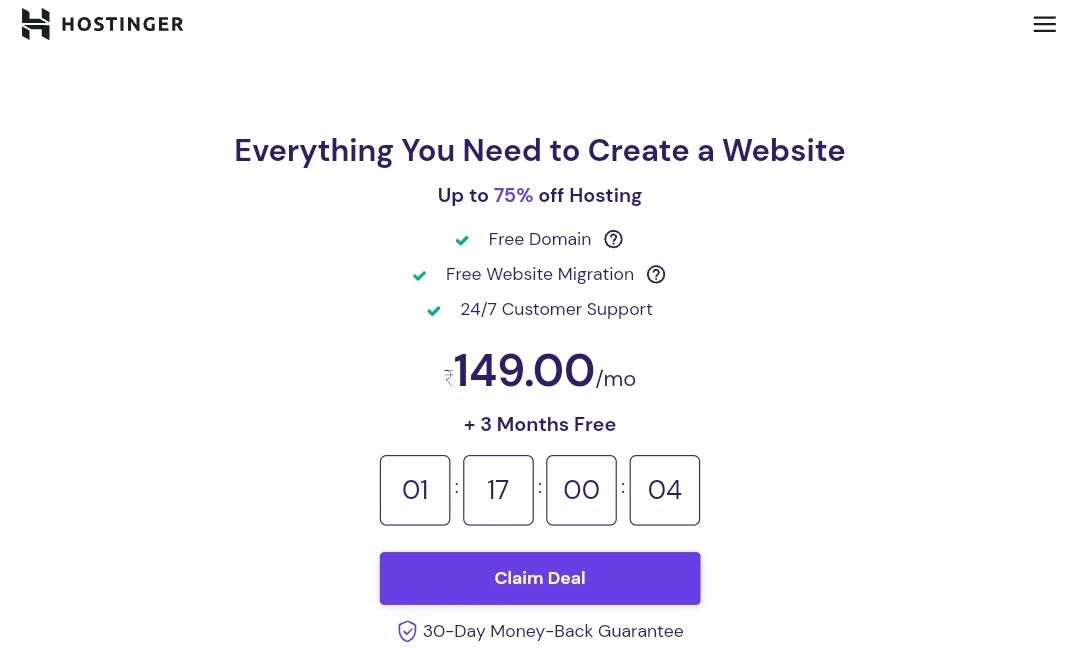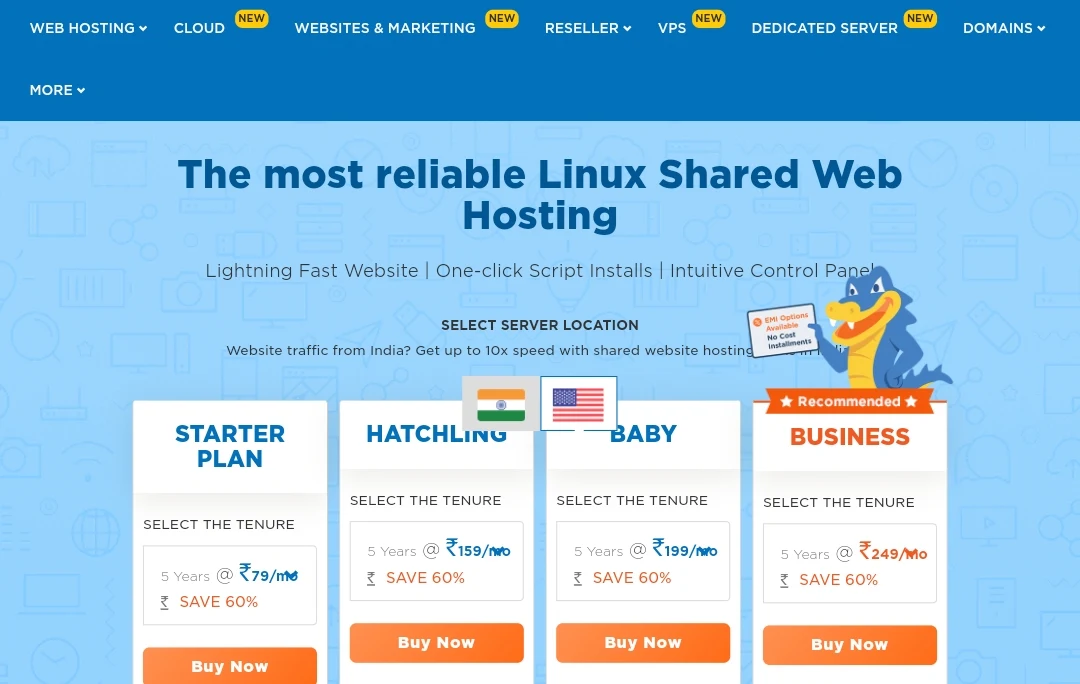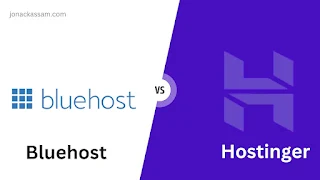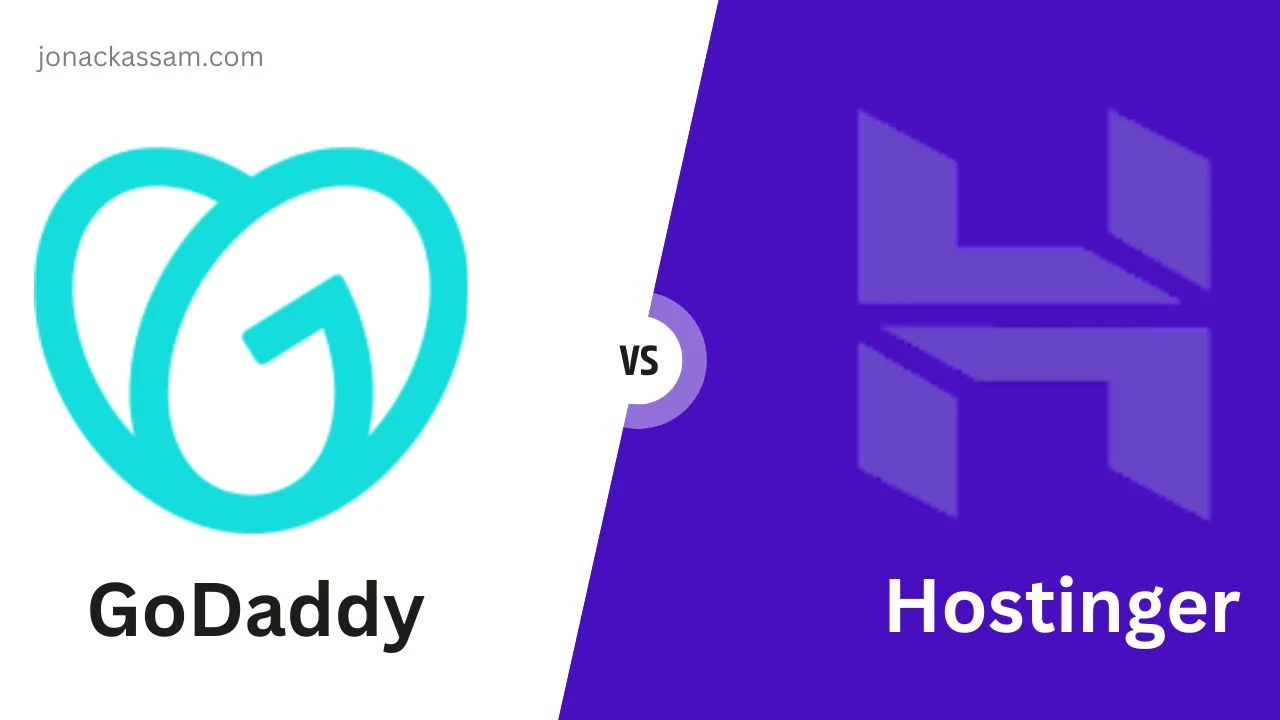If you're a blogger, you require a trustworthy and reasonably priced web server. After all, your blog serves as your online residence, therefore you want people to have access to it whenever they want.
It can be difficult to choose the best web hosting provider because there are so many options available. We created this guide to the top hosting provider for bloggers in 2023 for that reason.
We'll evaluate the top hosting companies based on aspects like cost, functionality, features, and customer service. We'll also offer you some advice on how to pick the ideal hosting provider for your requirements.
So read on for our choices for the top hosting service for bloggers in 2023, whether you're a beginner blogger or seeking to switch to a new hosting provider!
What is Web Hosting?
Making your website available to users throughout the globe is possible with the help of web hosting. You rent space on a server that is linked to the internet when you sign up for a web hosting service. The web hosting business then sends the files for your website to whoever requested them.
Here is an example of how web hosting works:
- Using a content management system (CMS) like WordPress or Wix, you can build a website.
- The files for your website are uploaded to the web hosting server.
- By transmitting the files via the internet, the web hosting business makes the files on your website available to anyone who requests them.
- A visitor to your website makes a request for the files from the web hosting server using their web browser.
- The files are sent from the web hosting server to the user's web browser, which then displays them on the user's screen.
Types of Web Hosting
There are numerous varieties of web hosting services accessible, each with unique benefits and drawbacks. Among the most well-liked styles of web hosting are:
Shared hosting: This kind of web hosting is the most cost-effective. Your website's resources are constrained since you share a server with other websites.
Dedicated hosting: This kind of web hosting is the most expensive. You pay for a dedicated server that is only used by your website. You now have more control over the resources and functionality of your website.
VPS hosting: Between shared hosting and dedicated hosting, this is the intermediate ground. A virtual private server that is cut off from other websites is one you rent. Compared to shared hosting, this gives you more control over your website's resources, yet it is less expensive than dedicated hosting.
Top 5 Web Hosting Companies for Bloggers
Bluehost
Popular web hosting Bluehost provides a selection of hosting packages for various website types. They have been in operation for more than 20 years and are one of the most reputable hosting companies in the market.
Small businesses and individuals with personal websites may choose Bluehost's shared hosting packages. They have a lot of features and are reasonably priced, such as:
- Unlimited storage space
- Unlimited bandwidth
- Free SSL certificate
- Free domain name for the first year
- Easy-to-use control panel
- 24/7 customer support
Additionally, Bluehost provides hosting packages for WordPress-specific websites. These packages include with all the capabilities of shared hosting packages in addition to several extras that are particularly useful for WordPress blogs, such as:
- Automatic WordPress updates
- Free CDN (content delivery network)
- One-click staging
- Dedicated WordPress support
Bluehost is a fantastic choice if you're looking for a reputable and reasonably priced web hosting company. They have a solid reputation for providing exceptional customer service and provide a selection of hosting options to suit various demands.
The following are some benefits and drawbacks of Bluehost hosting:
Pros:
- Affordable pricing
- Wide variety of hosting plans
- Easy-to-use control panel
- Excellent customer support
- Recommended by WordPress.org
Cons:
- Some users have reported slow performance
- Uptime can be inconsistent
- Some features are only available on higher-tier plans
All things considered, Bluehost is a fantastic web hosting solution, especially for small businesses and personal websites. They have reasonable prices, a large selection of hosting plans, and top-notch customer service. Bluehost is a fantastic option if you're looking for a reputable and reasonably priced web hosting company.
Additional factors to think about when using Bluehost hosting include:
- Any hosting package from Bluehost includes a free domain name for the first year.
- A 30-day money-back guarantee is also provided by Bluehost, allowing you to test out their hosting risk-free.
- WordPress.org recommends Bluehost as a hosting company.
- Bluehost has a sizable user base, and there are a ton of internet resources you may use to launch your website.
Before choosing Bluehost hosting, I advise reading customer reviews and evaluating their pricing options against those of competing service providers.
Also Check: How to Get Google Adsense Approval 2023: Get Fast AdSense Approval
Hostinger
Popular web host Hostinger provides a wide range of features and services at reasonable costs. They are an excellent option for companies of all sizes, from tiny startups to enormous corporations.
Among the features that Hostinger provides are:
- Unlimited bandwidth: As a result, you can handle any amount of traffic without having to worry about your website slowing down or going offline.
- Free domain registration: You receive a free domain name for the first year when you sign up for a Hostinger hosting package. As domain names normally cost around $15 per year, doing this can result in significant financial savings.
- Free SSL certificate: The information that is passed between your website and the browsers of your visitors is encrypted by an SSL certificate. This helps to safeguard the private data of your visitors, including their passwords and credit card numbers.
- 24/7 customer support: Live chat, email, and phone assistance are all available around-the-clock from Hostinger. This implies that you can always get assistance if you need it, regardless of the time of day.
- 99.9% uptime guarantee: 99.9% of the time, Hostinger promises that your website will be up and working. This means that you can be sure that your website will be accessible to users at all times.
In addition to these features, Hostinger also offers a variety of other services, such as:
WordPress hosting: Hostinger offers a dedicated WordPress hosting platform that is optimized for WordPress websites. This means that your WordPress website will be able to perform at its best when it is hosted on Hostinger.
VPS hosting: VPS hosting is a good option for businesses that need more resources than shared hosting can offer. VPS hosting gives you your own virtual server, which means that you have more control over the resources that your website uses.
Cloud hosting: A scalable hosting option that can expand with your company is cloud hosting. Your website will be able to withstand even the most arduous traffic spikes thanks to cloud hosting, which hosts it on many servers.
Overall, for companies of all sizes seeking for inexpensive web hosting with a variety of features and services, Hostinger is a solid option. They provide a selection of hosting packages from which you may pick the one that best suits your requirements and price range.
Here are some pros and cons of Hostinger:
The following are some benefits and drawbacks of Bluehost hosting
Pros:
- Affordable prices
- Wide range of features
- Free domain registration
- Free SSL certificate
- 24/7 customer support
- 99.9% uptime guarantee
- Dedicated WordPress hosting platform
- VPS hosting
- Cloud hosting
Cons:
- Customer support can be slow during peak hours
- Some features are not available on all plans
- Performance can be slow for high-traffic websites
Overall, Hostinger is a web hosting that offers decent value for the money. They provide a variety of features and services at reasonable costs. Hostinger is a wonderful choice if you're looking for a reputable and reasonably priced web hosting company.
GoDaddy
GoDaddy is a reputable company that has been in the web hosting industry for more than 20 years. From small businesses to enterprise clients, they provide a range of web hosting options to match their demands.
GoDaddy's web hosting plans include:
- Shared hosting: Shared hosting is the most affordable option from GoDaddy. It's a good choice for small businesses and individuals who don't need a lot of resources.
- VPS hosting: VPS hosting is a step up from shared hosting. It offers more resources and flexibility, making it a good choice for businesses that need more control over their website's performance.
- Dedicated hosting: The most expensive GoDaddy hosting option, dedicated hosting has the most resources and performance. It's a wonderful option for companies who require a website with a lot of traffic or processing capacity.
GoDaddy also offers a variety of features and services with its web hosting plans, including:
- Free domain registration: GoDaddy offers free domain registration with all of its web hosting plans.
- Unlimited bandwidth: GoDaddy offers unlimited bandwidth with all of its web hosting plans. This means that you can be sure that your website will never be slow due to traffic.
- Free SSL certificate: All of GoDaddy's web hosting plans come with a free SSL certificate. This is crucial for both security and raising the search engine rating of your website.
- 24/7 customer support: GoDaddy offers 24/7 customer support with all of its web hosting plans. This means that you can get help with your website any time of day or night.
Overall, GoDaddy Web hosting is a solid option for companies of all kinds who require dependable and reasonably priced web hosting. They provide a selection of plans as well as a number of features and services to help your website succeed.
Here are some pros and cons of GoDaddy web hosting:
Pros:
- Affordable prices
- Variety of plans to choose from
- Free domain registration
- Unlimited bandwidth
- Free SSL certificate
- 24/7 customer support
- Good uptime
Cons:
- Performance can be slow during peak traffic
- Customer support can be slow to respond
- Some features are locked behind higher-priced plans
In general, GoDaddy is a solid option for companies of all sizes searching for cost-effective and dependable web hosting. They provide a selection of plans as well as a number of features and services to help your website succeed. However, you might want to think about using a different web hosting company if your website receives a lot of traffic.
HostGator
- 99.9% uptime guarantee: HostGator guarantees that your website will be up and running 99.9% of the time. This means that your website is likely to be available to your visitors 24/7.
- Unlimited bandwidth: All of HostGator's hosting plans come with unlimited bandwidth. This implies that you do not need to worry about paying overage fees if your website receives as much traffic as you require.
- Free domain name: All of HostGator's hosting plans provide a free domain name for the first year. This may enable you to register a domain name for less money.
- Free SSL certificate: HostGator offers a free SSL certificate with all of their hosting plans. This is important for security and can help to improve your website's ranking in search engines.
- Easy to use: HostGator's hosting plans are easy to use, even for beginners. They offer a user-friendly control panel that makes it easy to manage your website.
- 24/7 customer support: HostGator has a team of experienced and knowledgeable customer support representatives who are available 24/7 to help you with any problems you may have.
- Reliable performance: HostGator has a good track record of uptime and reliability.
- Affordable prices: HostGator's hosting plans are very affordable, especially when compared to other major web hosting providers.
- Excellent customer support: HostGator has a team of experienced and knowledgeable customer support representatives who are available 24/7 to help you with any problems you may have.
- Easy to use: HostGator's hosting plans are easy to use, even for beginners. They offer a user-friendly control panel that makes it easy to manage your website.
- Free domain name: HostGator offers a free domain name for the first year with all of their hosting plans.
- Some security concerns: In the past, HostGator has been criticized for some security vulnerabilities. However, they have since taken steps to improve their security measures.
- Not the fastest web hosting provider: HostGator is not the fastest web hosting provider on the market, but they are still fast enough for most websites.
- Upsells: HostGator is known for their upsells. They will often try to sell you additional services that you may not need.
- The type of website you have: If you run a little personal website, a shared hosting plan can be sufficient. However, you could want a more robust hosting plan, such as a VPS or dedicated server, if you operate a bigger website or an online store.
- The amount of traffic you expect: You must select a hosting plan that can withstand the load if you anticipate high website traffic. Different hosting plans are available from HostGator to accommodate various traffic volumes.
- Your budget: The hosting packages offered by HostGator are extremely inexpensive, especially when compared to those of other well-known web hosts. However, if you want a hosting plan with higher power, you could have to spend extra.
SiteGround
A web hosting Service called SiteGround was established in Sofia, Bulgaria, in 2004. They provide a range of hosting packages for popular website building platforms including WordPress, WooCommerce, and others. SiteGround is renowned for their quick response times, consistent uptime, and top-notch customer service.
The following are some characteristics of SiteGround web hosting:
- The type of website you have: If you have a small personal website, you may be able to get away with a shared hosting plan. However, if you have a larger website or an e-commerce store, you may need a more powerful hosting plan, such as a VPS or dedicated server.
- The amount of traffic you expect: If you expect a lot of traffic to your website, you will need to choose a hosting plan that can handle the load. SiteGround offers a variety of hosting plans to suit different traffic levels.
- Your budget: SiteGround's hosting plans are more expensive than some other web hosting providers. However, they offer a variety of features and benefits that may be worth the extra cost for some businesses.
Here are some of the pros and cons of HostGator web hosting:
The following are some benefits and drawbacks of SiteGround web hosting:
Pros:
- Fast performance: SiteGround is one of the fastest web hosting providers on the market. They use a variety of technologies to ensure that your website loads quickly, including SSD storage, HTTP/2, and Cloudflare CDN.
- Reliable uptime: SiteGround has a 99.9% uptime guarantee, which means that your website is likely to be up and running 24/7.
- Excellent customer support: SiteGround has a team of experienced and knowledgeable customer support representatives who are available 24/7 to help you with any problems you may have.
- Easy to use: SiteGround's hosting plans are easy to use, even for beginners. They offer a user-friendly control panel that makes it easy to manage your website.
- Free SSL certificate: SiteGround includes a free SSL certificate with all of their hosting plans. This is important for security and for improving your website's search engine ranking.
Cons:
- Pricey: SiteGround's hosting plans are more expensive than some other web hosting providers.
- Not the best for large websites: SiteGround's shared hosting plans are not the best option for large websites with a lot of traffic. You may need to consider a VPS or dedicated server plan for these types of websites.
- Upsells: SiteGround is known for their upsells. They will often try to sell you additional services that you may not need.
SiteGround is an excellent web hosting company for small to medium-sized websites overall. They provide quick performance, consistent uptime, and top-notch customer service. They may not be the greatest choice for big websites nevertheless, as they are more expensive than some other web hosting companies.
How to Choose the Best Hosting Company for Your Needs
When choosing a hosting company for your blog, there are a few factors you'll need to consider:
- Understand your website needs: What type of website do you have? How much traffic do you expect? What features do you need? Once you know your needs, you can start to narrow down your choices.
- Research different hosting providers: Read reviews, compare features, and check pricing. There are many different hosting providers to choose from, so it's important to do your research and find one that's a good fit for your needs.
- Consider your budget: Web hosting can range in price from a few dollars per month to hundreds of dollars per month. It's important to set a budget before you start shopping so you don't overspend.
- Features: A good hosting provider will offer a variety of features that can help you with your website, such as:
- WordPress hosting: You need a hosting company that provides a dedicated WordPress platform if you are utilizing WordPress. This will make managing and protecting your website simpler.
- Email hosting: You can create email addresses for your website by using the email hosting services that a decent hosting provider offers. Customer service and communication depend on this.
- CDN: The performance of your website can be enhanced by a CDN (Content Delivery Network) by caching your content on remote servers. In other words, regardless of where they are, your visitors will get your material more quickly.
- Performance: A good hosting provider will ensure that your website loads quickly and reliably for your visitors. This is important for both user experience and SEO.
- Security: A good hosting provider will take care of your website's security so you don't have to worry about it. This includes things like malware protection, firewall, and daily backups.
- Scalability: You will require a hosting company that can scale with you as the popularity of your website increases. This entails being able to manage more data and traffic without your website stuttering or going offline.
- Support: A good hosting provider will have 24/7 support available so you can get help if you need it. This is important if you ever have any problems with your website.
Once you've considered these factors, you can start narrowing down your choices. Here are a few additional tips for choosing the best hosting company for your blog:
- Read reviews: Read reviews from other bloggers to get an idea of what other people think about different hosting companies.
- Try a free trial: Many hosting companies offer free trials so you can test out their services before you commit to a paid plan.
- Talk to a sales representative: Speak to a sales representative if you are still unsure about which hosting provider is best for you. They can assist you in comparing several plans and features to determine which is the best choice for your requirements.
Which is better between Hostinger and Bluehost?
Bluehost and Hostinger are two of the most well-known web hosting companies. Both provide a diverse set of features and services to fulfill the requirements of organizations of all sizes.
Bluehost: Bluehost is a well-known hosting company that has been in operation for over 20 years. Because they provide a dedicated platform for WordPress websites, they are a popular choice among WordPress users. Bluehost also provides a number of additional benefits, like as unlimited bandwidth, free SSL certificates, and 24/7 customer support.
Hostinger: Hostinger is a relatively young hosting service that has swiftly established itself as a prominent participant in the industry. They have very low-cost hosting plans starting at $2.69 per month. Hostinger also provides a number of other benefits, such as free domain registration, unlimited email accounts, and a free CDN.
Here is a comparison of Bluehost and Hostinger on some key factors:
| Feature | Bluehost | Hostinger |
|---|---|---|
| Price | Starting at $2.95 per month | Starting at $2.69 per month |
| Features | Unlimited bandwidth, free SSL certificates, 24/7 customer support, dedicated WordPress platform | Unlimited bandwidth, free domain registration, unlimited email accounts, free CDN |
| Performance | Good performance, but can be slow during peak traffic | Good performance, but can be slow for high-traffic websites |
| Customer support | 24/7 live chat support, phone support, knowledge base, and FAQs | 24/7 live chat support, knowledge base, and FAQs |
| Uptime | 99.9% uptime guarantee | 99.9% uptime guarantee |
Which is better bluehost or hostinger?
Bluehost and Hostinger are both excellent hosting services, but they offer distinct advantages and disadvantages. Bluehost is a more established service with more features, whilst Hostinger is a newer provider with lower prices. Finally, the best hosting provider for you will be determined by your individual requirements and budget.
Bluehost is a wonderful choice if you want a dependable hosting company with a large selection of options. If you're on a tight budget and looking for low-cost hosting, Hostinger is an excellent option.
Here are some additional things to consider when choosing between Bluehost and Hostinger:
Your website's size and traffic: If your website is huge or you anticipate a high volume of visitors, you will require a hosting service with additional resources. Bluehost is better suited to larger websites, whilst Hostinger is better suited to smaller websites.
Your experience level: Bluehost is a wonderful choice if you are new to web hosting because they provide more support alternatives. If you are more skilled with web hosting and want to save money, Hostinger is a wonderful option.
Your specific needs: If you have specific requirements, such as a dedicated WordPress platform or a CDN, you must select a hosting company that provides such services. Both Bluehost and Hostinger provide a number of options, however they may not provide everything you require.
I hope this helps!
Which is better between GoDaddy and Hostinger?
GoDaddy and Hostinger are two of the most popular web hosting providers on the market. Both offer a wide range of features and services to meet the needs of businesses of all sizes.
GoDaddy: GoDaddy is a reputable hosting company with more than 20 years of experience. They are a common option for companies of all sizes, but small firms and individuals favor them the most. Shared hosting, VPS hosting, dedicated hosting, and WordPress hosting are just a few of the features and offerings from GoDaddy.
Hostinger: A more recent hosting company, Hostinger, has grown to be a significant force in the market. They have very reasonable hosting packages available that start at just $2.69 per month. A free CDN, unlimited email accounts, and free domain registration are just a few of the things that Hostinger provides.
Here is a comparison of GoDaddy and Hostinger on some key factors:
| Feature | Bluehost | Hostinger |
|---|---|---|
| Price | Starting at $2.95 per month | Starting at $2.69 per month |
| Features | Unlimited bandwidth, free SSL certificates, 24/7 customer support, dedicated WordPress platform | Unlimited bandwidth, free domain registration, unlimited email accounts, free CDN |
| Performance | Good performance, but can be slow during peak traffic | Good performance, but can be slow for high-traffic websites |
| Customer support | 24/7 live chat support, phone support, knowledge base, and FAQs | 24/7 live chat support, knowledge base, and FAQs |
| Uptime | 99.9% uptime guarantee | 99.9% uptime guarantee |
Which is better GoDaddy or Hostinger?
Both GoDaddy and Hostinger are reliable hosts, yet they each have their own advantages and disadvantages. While Hostinger is a more recent supplier with more competitive price, GoDaddy is a more seasoned company with a wider selection of options. In the end, your unique requirements and financial situation will determine which hosting company is ideal for you.
GoDaddy is a wonderful choice if you're looking for a dependable hosting company with a lot of options. A wonderful option if you're on a tight budget and need inexpensive hosting is Hostinger.
Here are some additional things to consider when choosing between GoDaddy and Hostinger:
Your website's size and traffic: You will require a hosting company with greater capacity if your website is huge or you anticipate heavy traffic. For bigger websites, GoDaddy is a superior option, whereas for smaller ones, Hostinger is.
Your experience level: GoDaddy is a fantastic alternative because they provide more assistance options if you are new to web hosting. If you are more knowledgeable about web hosting and wish to cut costs, Hostinger is a fantastic option.
Your specific needs: You must pick a hosting service that delivers the capabilities you require, such as a dedicated WordPress platform or a CDN, if you have any particular requirements. Even though GoDaddy and Hostinger both offer a wide range of capabilities, you might not find everything you require there.
Here is a table that summarizes the key differences between GoDaddy and Hostinger:
| Feature | GoDaddy | Hostinger |
|---|---|---|
| Price | Starting at $5.99 per month | Starting at $2.69 per month |
| Features | Unlimited bandwidth, free SSL certificates, 24/7 customer support, dedicated WordPress platform | Unlimited bandwidth, free domain registration, unlimited email accounts, free CDN |
| Performance | Good performance, but can be slow during peak traffic | Good performance, but can be slow for high-traffic websites |
| Customer support | 24/7 live chat support, phone support, knowledge base, and FAQs | 24/7 live chat support, knowledge base, and FAQs |
| Uptime | 99.9% uptime guarantee | 99.9% uptime guarantee |
| Domain registration | Extra | Free |
| Free SSL certificate | Yes | Yes |
| CDN | Yes | Yes |
| Email accounts | 100 | Unlimited |
| Storage | 100 GB | 200 GB |
| Bandwidth | Unlimited | Unlimited |
| Website builder | Yes | No |
| WordPress hosting | Yes | Yes |
| VPS hosting | Yes | Yes |
| Dedicated hosting | Yes | Yes |
In the end, your unique requirements and financial situation will determine which hosting company is ideal for you. GoDaddy is a wonderful choice if you're looking for a dependable hosting company with a lot of options. A wonderful option if you're on a tight budget and need inexpensive hosting is Hostinger.
Also Check: Best Google AdSense Alternatives for Bloggers
FAQ's - The 5 Best Web Hosting Companies for Bloggers in 2023
What is the difference between web hosting and web server?
A computer that keeps and transmits your website to the internet is known as a web server. An organization or service known as a "web host" makes use of web servers to store and present your website.
What's the difference between host and domain?
The host is the computer server where the files for your website are kept. The domain is the website's address.
What is web hosting?
Web hosting is a service that allows people and businesses to make their websites available on the internet. It entails storing website files, data, and content on a server connected to the internet, ensuring that users may access the website by typing the domain name into their web browsers.
What is a domain name?
A domain name, such as www.example.com, is the human-readable address used to access a website on the internet. It is associated with an IP address, which is the actual numerical address that computers use to find the website's server.
What types of web hosting are available?
Web hosting is classified into numerous forms, including shared hosting, virtual private server (VPS) hosting, dedicated hosting, cloud hosting, and managed WordPress hosting. Each type provides varying degrees of performance, control, and scalability.
What is shared hosting?
Multiple websites are hosted on the same server with shared hosting. These websites share resources such as CPU, RAM, and disk space, making it a cheap solution for small websites and newbies.
What is VPS hosting?
VPS hosting allows you to run a virtual private server on top of a bigger physical server. It provides greater control and resources than shared hosting, making it appropriate for websites requiring more power and personalization.
What is dedicated hosting?
Dedicated hosting provides an entire physical server dedicated to a single website or customer. This offers the highest level of performance and control but is typically more expensive.
What is cloud hosting?
Cloud hosting uses a network of interconnected servers to host websites. It offers scalability and flexibility, allowing resources to be easily adjusted based on website demands.
What is managed WordPress hosting?
Managed WordPress hosting is designed specifically for WordPress websites. The hosting provider takes care of technical aspects such as updates, security, and performance optimization, allowing website owners to focus on content.
How much does web hosting cost?
The cost of web hosting varies based on the type of hosting, the resources allocated, and the hosting provider. Shared hosting is usually the least expensive, while dedicated hosting tends to be more costly.
What is uptime?
Uptime refers to the amount of time a website is operational and accessible to users. Web hosting providers often advertise their uptime percentage, indicating how reliable their service is.
What is bandwidth?
Bandwidth is the quantity of data that can be sent between the server and the browsers of visitors. It influences how much traffic your website can handle. Some hosting plans provide limited bandwidth, while others provide unmetered or unlimited bandwidth.
How do I choose the right hosting provider?
Consider your website's needs, budget, technical support, performance, scalability, and user reviews when choosing a hosting service. It is critical to select a provider who shares your website's goals and requirements.
Can I switch hosting providers?
Yes, you can change hosting providers if you are unhappy with your present one. However, because the procedure may involve moving files, databases, and configurations, it is suggested that the migration be carefully planned and executed to avoid downtime.
Conclusion
Selecting the finest hosting company for your website is an important decision. By carefully examining your needs and financial resources, as well as reading evaluations from other bloggers, you can pick the finest hosting partner for your site.
We hope you found this tutorial to be helpful. Please leave a remark if you have any questions.

.jpg)
.jpg)






